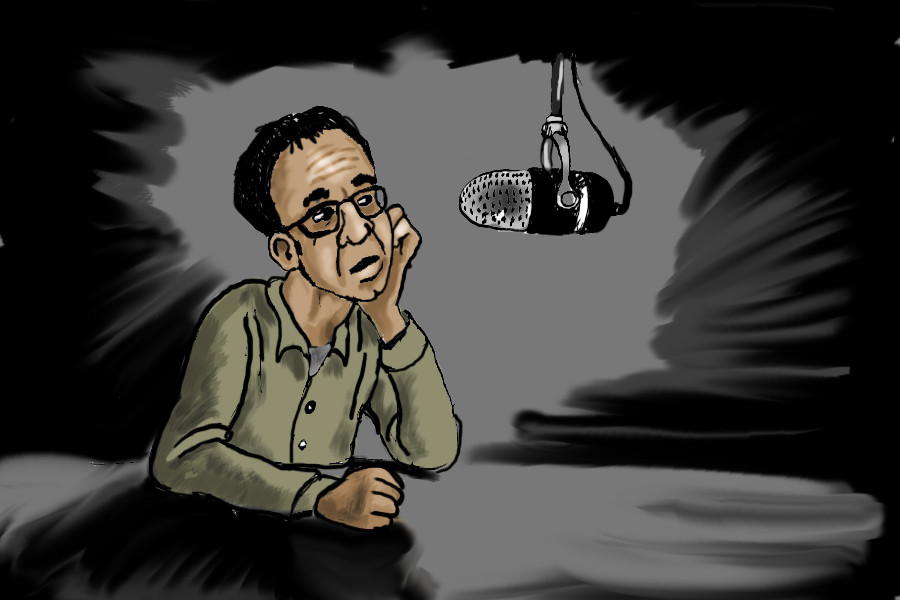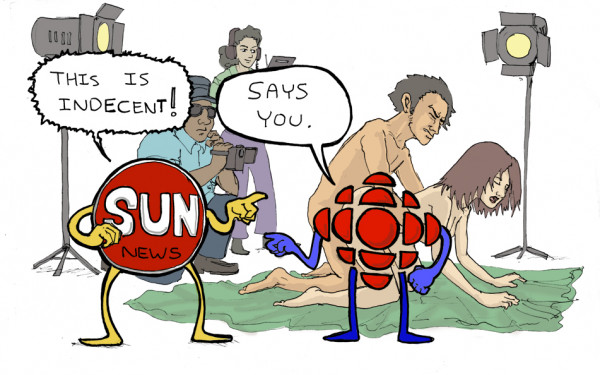Stories His Mother Never Told Him
WireTap’s Jonathan Goldstein Reads at Concordia
Ever heard of Autumn Break? Seeing with sound? Hearing with smell? Poe’s The Raven accompanied by banjo?
Those are just a few of the precious gems to come out of CBC Radio’s WireTap, hosted by Jonathan Goldstein.
Goldstein was at Concordia’s Liberal Arts College on Tuesday, sharing some of his short stories with an eager audience.
On the outset, it seemed like a regular evening lecture class for LAC students. Bursts of laughter, however, were a telling sign that this was a special speaker.
Goldstein has published three novels, produced This American Life and now hosts/produces WireTap. This week, he will also be sending in his 214th column for The National Post.
His reading was titled Ladies and Gentleman, the Bible!, which is also happens to be the title of his latest book.
It’s a re-telling of a selection of Bible stories, with Goldstein’s trademark comedic neurosis in every verse.
“I didn’t really have a great ease with fiction and plotting,” said Goldstein. “I felt if I just took the Bible stories and then I’d have the stories and could fill them with all the fun stuff, like the neurosis and jokes and stuff like that. It was fun to unpack [those stories].”
“I didn’t really have a great ease with fiction and plotting,” said Goldstein. “I felt if I just took the Bible stories and then I’d have the stories and could fill them with all the fun stuff, like the neurosis and jokes and stuff like that. It was fun to unpack [those stories],” he said.
He read two other passages before his Biblical selections, one about his mother and one about trying to lose his virginity. The latter was originally drafted for WireTap, but ended up not being used.
“It’s like a dream job – I feel very lucky,” he said about his work at CBC. He’s got an unlikely driving force behind his success.
“My anxiety is behind me chasing me, it’s not great but it gets the job done,” said Goldstein.
What may be most fascinating about Goldstein, however, is the seeming ease with which he finds ideas for the show and his stories.
“I guess everybody has things that they are able to do with ease,” he said. “There are certain things that inspire me, for sure. My friends do, like whenever they say something funny, I’ll write it down. My family, I can find very funny. I sometimes find that also reading really depressing stuff could somehow get my mind going, maybe it’s like a natural reflex or something.
“When I was a kid, I used to go to synagogue and during Kaddish, the prayer for the dead, I used to always get attacks of the giggles – which was really inappropriate. Maybe it’s a kind of anxiety where I feel like I need to punch up sad things with jokes to make myself feel better.”
Goldstein wasn’t always headed for radio. He studied Creative Writing at McGill, then graduate studies at Concordia. Concordia refused him twice from the BA program in Creative Writing and twice from the MA program.
“In fact, the second time I didn’t get in, I went to talk to the professor because I was feeling beaten down. I asked him why I didn’t get in, and he said that someone who wrote the way that I did needed to be in therapy more than they needed to be in Creative Writing,” said Goldstein. “Anyways, I showed him”
Goldstein didn’t always have an easy time getting published and worked for 10 years as a telemarketer in the interim.
“I probably have a box somewhere filled with rejection letters. I don’t know why I kept them; I guess I’m a masochist. They’re probably in my parents garage,” he said.
For Goldstein, telemarketing and radio are surprisingly similar. “[They need] the same kind of impulse of trying to keep the person on the line by constantly presenting something new and getting them to keep listening to you.”
Though Goldstein says he still loves the romance of writing, he also likes the different system of working for radio.
“The great thing about radio is that there isn’t that same existential feeling of staring at a blank page,” he said. “You start off with tape and then you edit it, so it’s more like sculpting.”




WEB_600_375_90_s_c1.jpg)

1_600_375_90_s_c1.jpg)